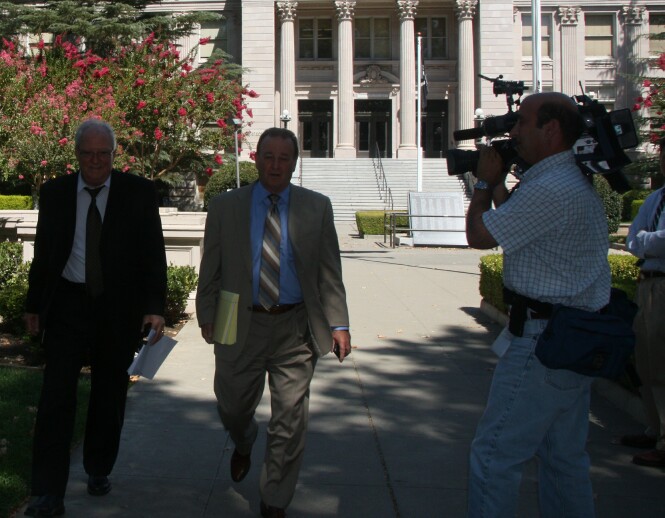 On November 14, Judge Paul Richardson dismissed Juror No.11 from the penalty phase of Marco Topete’s trial for the murder of Sheriff’s Deputy Tony Diaz, after a brief inquiry in which he determined the request for dismissal was based on a language barrier.
On November 14, Judge Paul Richardson dismissed Juror No.11 from the penalty phase of Marco Topete’s trial for the murder of Sheriff’s Deputy Tony Diaz, after a brief inquiry in which he determined the request for dismissal was based on a language barrier.A little more than a week later, Juror No.6 told the Davis Enterprise that the juror had been opposed to the death penalty in this case.
“She said under no circumstances will she go for the death penalty,” the juror, who is apparently a Davis resident but is withholding his name, told the Enterprise four days after the jury came back with a death sentence recommendation.
“If that lady had not been excused, we would have been a hung jury,” the juror said.
The juror “added that while he believes Topete is deserving of the death penalty,” he believes “the law was not properly administered in this case.”
Now, as the January 12 sentencing date approaches, attorneys for Mr. Topete have produced a new declaration from Juror No.6 which is included in a filing. Last Thursday, attorneys filed a motion to seal the declaration of Juror No.6 to prevent its release to the public.
However, the Sacramento Bee has apparently acquired that declaration, along with the motion by the defense to set aside the death penalty in this case.
The Bee reports that Juror No. 6 told defense investigators, “The dismissed Juror No. 11 is an educated woman who worked on crossword puzzles during breaks and held numerous conversations with him in English, without problem.”
Instead, her difficulty was that she disagreed with the other jurors as to whether Mr. Topete deserved the death penalty.
The Bee continues, “On the first day of jury deliberations, the woman told other jurors she felt strongly that mitigating evidence, including testimony about Topete’s violent and crime-ridden childhood, suggested he should serve life in prison without the possibility of parole and not be executed.”
And adds: “She was ‘fixated’ on a photograph of a young Marco Topete standing with his father beneath a Christmas tree, both with guns and ammunition slung over their shoulders, the juror said.”
“While the deliberations were respectful, it was clear that (she) wanted to hold out for a life sentence, and she was the only one of us who felt that way,” Juror No.6 said as reported by the Bee.
It was only after other jurors tried to persuade her to change her mind that she apparently “tore a page from her notebook, wrote a note to the judge and handed it to the bailiff. None of the other jurors knew its contents.”
She wrote in that note, “Your Honor: I was raised in foreign country and it is very difficult for me to make a dessision from point of view of this country. I tried my best, but now I see that I am dragging other juries down. I am asking you to replace me by alternative juror, please.”
She was called into court on November 14 as Judge Richardson tried to figure out the reason for the note and the appropriate action required by the law.
Judge Richardson asked her if there were a language barrier and if she had been having trouble understanding the nuances of the language. She said that she might be having trouble with the nuances, but that is not the principle issue.
She then said that the language barrier was “partially” the issue and that sometimes she cannot understand the words because, she said, some words you cannot translate.
In a separate 12-page motion, the defense moved that the court reduce the defendant’s punishment to life without parole pursuant to Penal Code Section 190.4(e) which “requires that the trial judge make an independent determination whether imposition of the death penalty upon the defendant is proper in light of the relevant evidence and the applicable law.”
The defense points to the fact that at the time of the offense, Mr. Topete had been drinking a significant amount of alcohol.
The defense points to testimony from Dr. Tucker who, in reviewing the dash cam video, testified, “My analysis was that Mr. Topete was taken by surprise by the officer approaching him, was not expecting that. He was increasingly anxious as this went along. Was keeping the car in some motion. Was talking to the officer, but was experiencing a mounting level of panic, at some point, fled. Reached a point where he just drove away.”
They also bring back mitigating factors in his background, namely that his family “failed to protect Marco Topete and exposed him to drugs, alcohol, and violence. His father was characterized by both Dr. Minagawa and Dr. Haney as a toxic influence.”
They also point to the testimony of Dr. Haney, who “testified that from the age of fifteen, Marco grew up and matured in some form of institutional setting,” where “from the age of fifteen through twenty, [he] experienced little or no effective treatment in the local juvenile justice system.”
“The only reasonable conclusion that can be taken from Dr. Minagawa’s testimony is that free will is not really true, the decision making process is affected by one’s upbringing (also the stressors of the moment),” the defense continues. “It was not Marco’s choice to be raised the way he was. He was a high-risk child without support and his criminal history is predictable. Marco’s evolution while in custody failed to provide him with the skills to do much of anything except survive in prison.”
“Marco is not the worst of the worst. While in Pelican Bay he had no write-ups for significant violence and he educated himself in a very difficult environment,” they add noting, “He has positive personality traits as demonstrated by the testimony of family members.”
In his response, District Attorney Jeff Reisig urges the court to “reach the same conclusion as the jury and find that death is a fair, just, and appropriate sentence in this matter.”
He called it a “cold, calculated and violent murder” of a peace officer as a means to avoid and prevent a lawful arrest, perpetrated by an active gang member and performed while lying in wait.
The district attorney writes, “The premeditated and deliberate killing of Deputy Diaz was not the first violent act committed by the defendant, but rather the culmination of a long history of violence crime” that he says began on November 1, 1992, when “the defendant began his streak of violent criminal behavior by leading police on a high-speed chase through Woodland.”
These arguments, which were brought up during the penalty phase before the jury, would be a mere formality were it not for the overriding issue of Juror No.11’s dismissal and the reasoning behind it.
The Bee’s legal researchers were not sure what to make of the matter, calling it largely unprecendented. Though there have been a number of bumps along the way, Judge Richardson, to this point, has resisted altering the trajectory of the trial and it will be interesting to see if this becomes the first legal cause to really do so.
—David M. Greenwald reporting





This case shows the problems lone juror holdouts have in our justice system. When you have 11 people in a room putting pressure on a lone holdout, it becomes quite difficult for the lone holdout to stand his/her ground. The problem is society wants the jury to come to some sort of consensus, and that is not always possible if one juror (or more) disagrees with the majority. As with anything else, our justice system is not perfect and never will be… it’s a conundrum…
Topete will probably never see the chair. It isn’t that he is falsely convicted or is a sympathetic perp or that the jury system failed. It is that the law has become unenforceable and too costly. I hope that the sentence gives the victims family some closure because they are unlikely to ever see Topete get the shot.
Elaine: All of that is true but also aside from the critical point here which is whether removing the jury (A) was appropriate and (B) necessitates a hung jury. I cannot imagine an appellate court would allow a death penalty verdict to stand under these conditions.
David, is Juror No. 6’s name supposed to be a secret? I happen to know his name. However, I won’t reveal it if there is some reason I should not.
FWIW, I fully believe Juror No. 6’s account. It rings true.
It will be interesting to see whether the rest of the jurors (including #11) perceive things the way that Juror #6 says they happened. Were they all in the courtroom when Judge Richardson questioned and excused #11? [quote]“…attorneys for Mr. Topete have produced a new declaration from Juror No. 6 which is included in a filing.” [/quote]Is the “declaration” in some sort of sworn statement? Did the request to seal coincide with the filing, or was the material already public before the request to seal? Had it been sealed before the [u]Bee[/u] got it?
It seems that Judge Richardson did not adequately determine the reason for #11’s desire to withdraw, if we’re to believe this report. Regardless of how one feels about the death penalty, it seems shaky to keep switching jurors because one doesn’t agree with the rest. These would be just as problematic if the system gets to keep going to alternates until 12 agree during the guilt phase of a trial.
Rich: The name has been redacted from all reports, so I believe it would be better not to reveal it unless he wishes to come forward.
“Were they all in the courtroom when Judge Richardson questioned and excused #11? “
None were allowed into the courtroom as it would have contaminated the entire care.
“Is the “declaration” in some sort of sworn statement? “
Yes that is what a declaration is.
“Did the request to seal coincide with the filing, or was the material already public before the request to seal? Had it been sealed before the Bee got it? “
I am not sure.
“It seems that Judge Richardson did not adequately determine the reason for #11’s desire to withdraw, if we’re to believe this report.”
That was my impression at the time. He and the DA suggested it was a language issue, they offered it to the juror, and she ran with it. I believe he contaminated his own inquiry. I thought so at the time that he conducted it – this just further bolsters that belief.
Good question, Rich. It’s my understanding that jurors’ names are released once a trial is completed. Unless a judge specifically rules otherwise, this is all part of our fair-trial-by-our-peers. Anonymous juries don’t fit well into our process.
Is #6 identified by name in the declaration, David?
[quote]Elaine: All of that is true but also aside from the critical point here which is whether removing the jury (A) was appropriate and (B) necessitates a hung jury. I cannot imagine an appellate court would allow a death penalty verdict to stand under these conditions.[/quote]
The interesting thing here is had there been a declared hung jury, another jury would have been seated, the voir dire more carefully done, and the newly seated jury most likely would have come to the conclusion the death penalty should be imposed (I’m of course just guessing, but in light of the near unanimity of the verdict, I don’t think my assumption of a sentence of death is unreasonable). Now let’s suppose the sentence here is vacated because of juror #11’s dismissal. Will the sentence be commuted to LWP, or will there be a new trial, with the likelihood of the death penalty being imposed? I assume it will be up to the DA to decide how far they want to go with this if the sentence is vacated…
David, I’m running behind others’ comments. What “reports” are you talking about: ‘The name has been redacted from all reports”?
And what reasons were given for redacting Juror #6’s name? This seems unusual.
Rule 8.332 of the California Rules of court section (b)
Requires that the Juror Names, addresses, and telephone numbers:
(b)(1) “The name of each trial juror or alternate sworn to hear the case must be replaced with an identifying number wherever it appears in any document. The superior court clerk must prepare and keep under seal in the case file a table correlating the jurors’ names with their identifying numbers. The clerk and the reporter must use the table in preparing all transcripts or other documents. “
“The interesting thing here is had there been a declared hung jury, another jury would have been seated, the voir dire more carefully done, and the newly seated jury most likely would have come to the conclusion the death penalty should be imposed”
That may be, but it is irrelevant because we have a process issue not an outcome issue.
Keep in mind that juror #6 might not be telling the truth, or might be telling things as he perceives. Also keep in mind that there could be other things at play in the deliberations beyond what has been reported.
What juror #6 said about former juror #11 is hearsay. I don’t think the appellate court will give much weight to juror #6’s statements. To truly understand the matter, they would have to question the other 11 jurors about what was said/done in deliberations, which would be a gross violation of the process.
Rifkin, did you talk to any of the others?
[i]”Rifkin, did you talk to any of the others?”[/i]
No.
Mr. Grundler:
“To truly understand the matter, they would have to question the other 11 jurors about what was said/done in deliberations, which would be a gross violation of the process.”
Actually there is a recent case that was overturned where they did something close to that: link ([url]http://davisvanguard.org/index.php?option=com_content&view=article&id=4043:appeals-court-throws-out-yolo-county-case-for-juror-misconduct&catid=74:judicial-watch&Itemid=100[/url])
In the case I linked, the juror had improperly used a prop to conduct an experiment:
[quote]This court tell us that Juror No. 10 provided an affidavit stating that “[d]uring jury deliberations, when it was his turn to speak, a juror that I don’t recall his name, but was a teacher, told jury members that he had conducted an experiment at home where he sat in his car as a passenger and had a broomstick, pretending he was shooting at a house. The juror said that after his experiment, he felt that one of the shootings was intentional and deliberate.”
Juror No. 11 also submitted an affidavit stating that Juror No. 2 told the jury about the results of an experiment he had done at home “to determine if Joshua Latham can with his right hand, lower the car window and quickly stick the rifle out.”
According to the court, “Juror No. 2 said he tried the experiment using a broomstick both right-handed and left-handed. He felt that if the shooter was right-handed, it would be a lot less difficult than if he was left-handed. The remarks were made toward the end of deliberations, when the jury was unable to come up with a unanimous vote.”[/quote]
So the appellate court, generally through the attorneys can request jurors to submit affidavits to declare what they observed.
In another case I am familiar with, there is an exhibit in question and the defense has had their investigator speak to each of the jurors to assess what happened there.
[quote]That may be, but it is irrelevant because we have a process issue not an outcome issue.[/quote]
No, ultimately we have an outcome issue – whether Topete receives death sentence or LWOP!
[quote]In the case I linked, the juror had improperly used a prop to conduct an experiment: [/quote]
Entirely different situation…
DMG,
I am wondering if there is a distinction between questioning jurors about their actions vs. questioning jurors about what was said. The latter seems dangerous.
“No, ultimately we have an outcome issue – whether Topete receives death sentence or LWOP!”
The question is whether he got a fair trial.
“Entirely different situation… “
Sigh. It is still a matter of determining from the jurors what happened.
David:
You’ll note in the case I cited today, there was a fully inquiry with all of the jurors questioned. I see no way around it.
[i]”No, ultimately we have an outcome issue – whether Topete receives death sentence or LWOP!”[/i]
Elaine and David, outcome and process are not in this case mutually exclusive.
If the proper process was not followed, Topete will not be executed by the state. I favor executing him*. It seems to me likely the proper process was not followed with regard to the Russian juror.
*I concede that I do not think there is any real justice in the California death penalty system. It is often a whimsical lottery as to which murderers get executed and which get life; and because the dealys are so long between a death sentence and the execution, my view is that killing the b&stards doesn’t do any good.